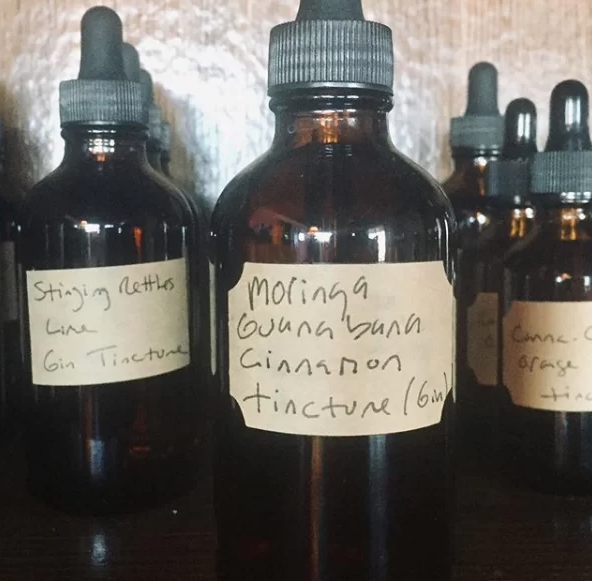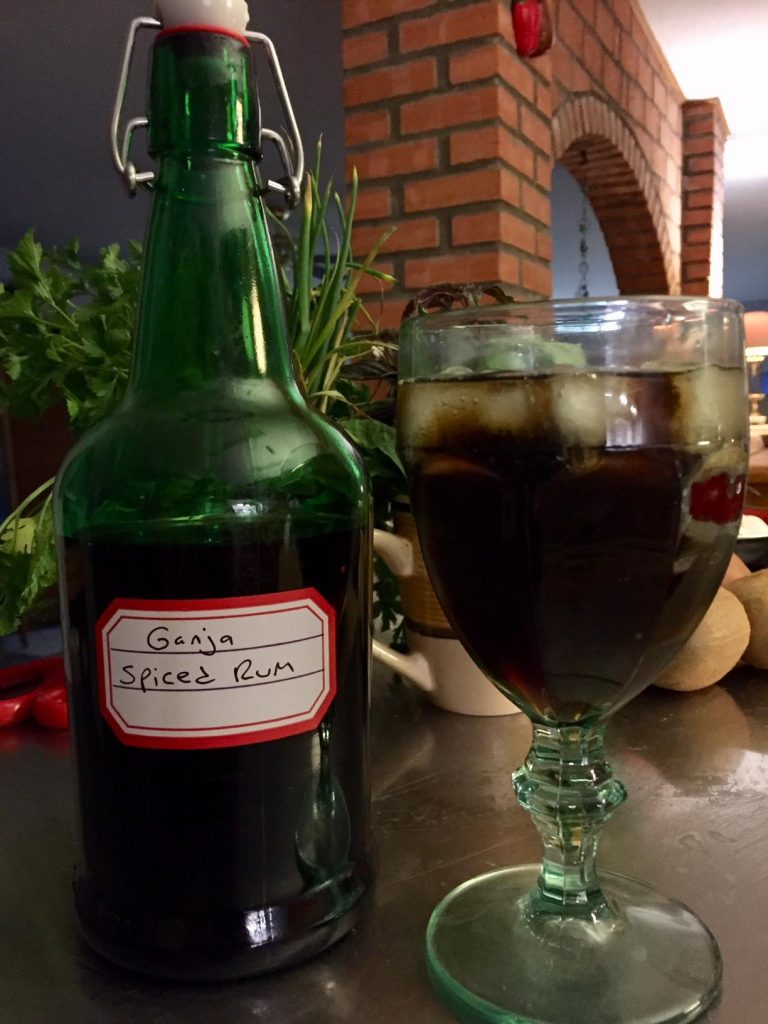Tinctures and tonics are basically the same thing. Tinctures are typically taken with a dropper, a tonic can be taken with a teaspoon. I like to call my infused drinking alcohol a tonic, but technically, a tincture is any plant steeped in alcohol.
The true definition of tonic is both a noun and an adjective. When used as a noun, it’s a feeling of well-being – you could say a friend is a tonic to your soul, or a cool drink of water on a hot day is a refreshing tonic that soothes. When used as an adjective, it describes the feeling of well-being given.
Making a tincture with drinking alcohol is the simplest and oldest form of infusion for remedy on the planet. Alcohol strips beneficial terpenes and cannabinoids easily and quickly. In a cold-steep, the tetrahydrocannabinol, or THC, is not activated – giving whole plant, or full spectrum benefits without the high.
The compound in cannabis with the potential to induce psycho-activity is not actually called THC, its formal name is THCA, and doesn’t become psychoactive THC until heated – and why we smoke. THC is also activated in a hot infusion, or by decarboxylation of the plant first on low heat.
To Decarb or Not to Decarb?
I’ve never really been into decarbing plant material before making remedies, as I’m not looking for a big high. My goal is to make remedy to be well, or to have a general overall feeling of well-being.
When I make remedies with heat the THC is naturally activated enough for my liking. If you must have activated cocktails, decarbing your plant material prior to steeping is warranted.
Cold-steeped non-psychoactive tinctures and tonics can also be activated by sitting the bottle in a sunny window sill for a couple of hours. But, beware, it will be a strong mix. When the THC is activated, one shot of liquor into a cocktail is a very strong dose.
Remember the dosing motto, “start low, go slow,” or you may have an out-of-body experience, for high THC and too much alcohol can induce what’s called, phasing, causing the partaker to black-out – with no fun had by anyone.
No More Hangovers!
I’m not really a big drinker, I began to infuse my drinking alcohol to combat the negative effects of the alcohol itself – mainly inflammation, causing headaches; upset tummy – hangovers. After I have a cocktail with one of my tonics, I actually feel good. It’s a tonic!
There are a few recipes on my website for tinctures and tonics made with plants infused in drinking alcohol. The Skies the limit on the combinations of plants you can use. Following is my all-time-favorite alcohol infusion:
Ganja Spiced Rum
1 liter brown rum
¼ cup ground cannabis flower
4-5 whole Star Anise, 4-5 whole cloves
1 t. cardamom seeds or 5-6 pods
1 stick cinnamon
1 t. ground black pepper
1 t. vanilla
Steep in glass or metal container for up to two weeks in a cool, dark cupboard.
Strain and decant.
Sharon’s Favorite Cocktail: Ganja Spiced Rum & Coke-a-Cola: 1 shot of rum per one 16 ounce glass of coke on ice.
#NotJustCannabis
While cannabis is a superfood, the spices in this recipe are equally beneficial. As follows:
Cinnamon: Lowers blood sugars, treats diabetes
Star Anise: Lowers risk of cancer (antioxidant), promotes healthy skin; anti-fungal, strengthens the immune system, aids in digestion and sleep.
Cardamom: Gastrointestinal prevention, controls cholesterol, cardiovascular aid, blood circulation, dental aid, urinary tract infections, such as cystitis, nephritis, and gonorrhea.
Black Pepper: Antioxidant, digestion aid, may slow aging, improves dental heath, aids in skin conditions.
Vanilla: Aids in treating acne, improves hair growth, speeds healing, anti-inflammatory, chronic disease prevention, cardio protection.
Cloves: Antioxidant, antifungal, antibacterial, aphrodisiac, antiviral, antiseptic, anti-inflammatory, and analgesic properties.
Superfoods, Superplants
The obvious thread of commonality with the above list of benefits from the spices listed, is the matching benefits each plant has to cannabis as a superfood.
To remind, a superfood is any plant that has myriad benefits for a wide range of symptom relief, while strengthening the immune system.
Anti-inflammatory properties are also a given with most beneficial plants, and is typically at the top of the list. Antifungal, antibacterial, and anti-infection is another common thread.
Antioxidant properties are also a given, and it’s always been curious to me how we can say a plant has antioxidant properties, but we can’t say it will kill cancer cells – when that’s exactly what it means!
The skies the limit as to combinations of herbs and spices you can add to drinking alcohol to create the perfect beneficial tonic. There are more combinations on my website.
As a footnote, if you can’t drink or tolerate alcohol, apple cider vinegar (ACV) infuses in the same way as alcohol. Please see the Kitchen Apothecary piece on ACV for more information.
Published and Written by Sharon Letts in Weed World Magazine Issue 146
- Kitchen Apothecary – Sharon Letts
- Kitchen Apothecary: Making Cannabis Oil at Home – By Sharon Letts
- Kitchen Apothecary – Cannabis to the Canine Rescue, By Sharon letts
- Kitchen Apothecary: Kids & Cannabis: A cannabis chamomile honey tincture to calm, focus, and reset, By Sharon Letts
- Kitchen Apothecary – Apple Cider Vinegar Infusions – By Sharon Letts
- Kitchen Apothecary, Treating Diffuse & Follicular Non-Hodgkin’s Lymphoma and Chronic Pain with Cannabis Infused Olive Oil.
- Kitchen Apothecary – Easy Tinctures & Tonics – By Sharon Letts
- Kitchen Apothecary, Infused Ice Cream From Belushi’s Farm, By Sharon Letts
- Kitchen Apothecary: The Herbal Bar, Setting up an herbal bar, with and without alcohol
- Kitchen Apothecary – Cannabis Infused Honey & Ganja Chai tea – By Sharon Letts
- Kitchen Apothecary: Herbed Salad Dressing Using Infused Olive Oil, By Sharon Letts
- Kitchen Apothecary: Debi Bair, Cannabis Patient & Remedy Maker – By Sharon Letts
- Kitchen Apothecary: Grace Elisea, Cabo Cannabis Company – Circus Animal Doughnuts! By Sharon Letts









